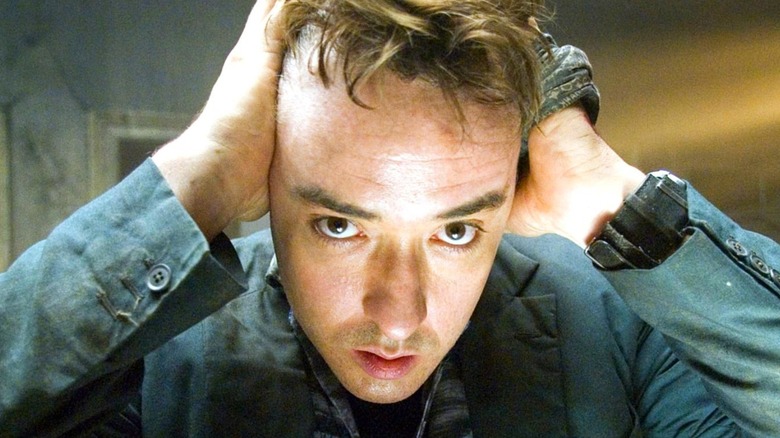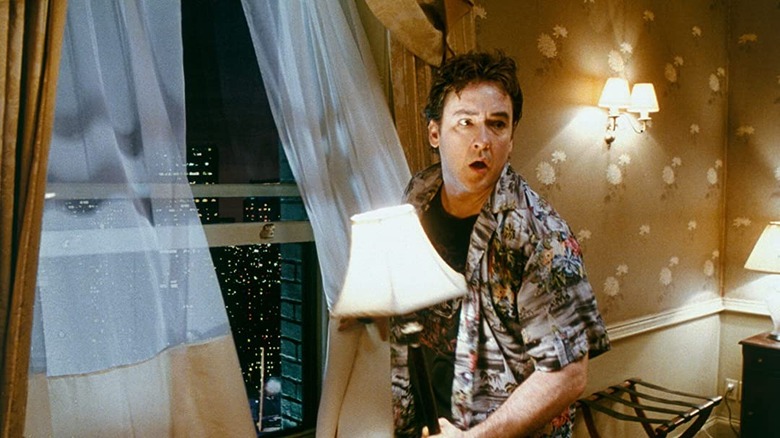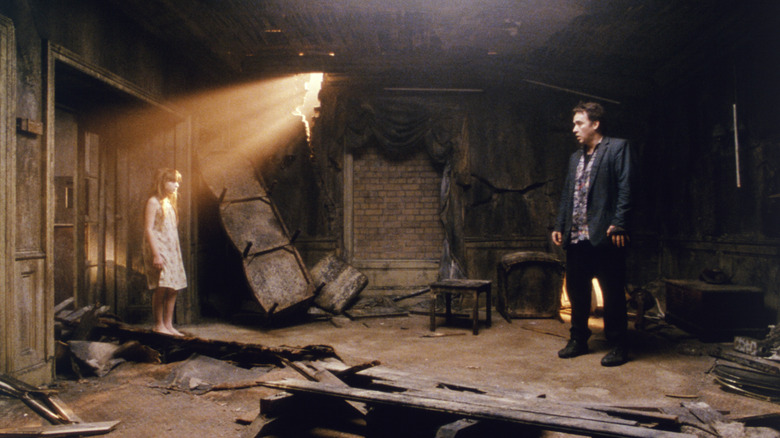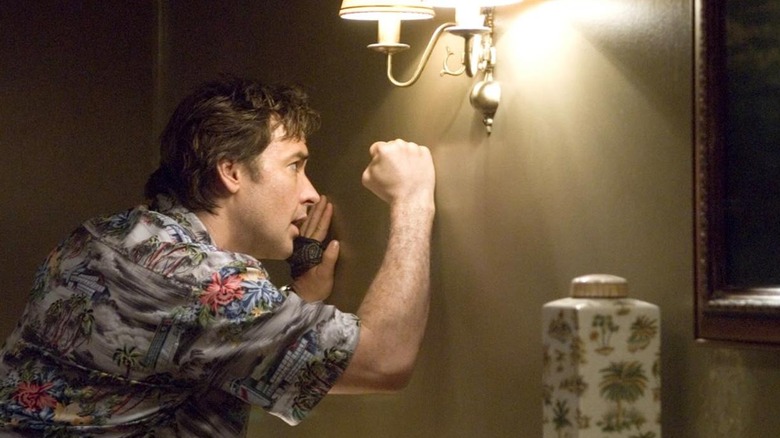The Ending Of 1408 Explained
In 1999, prolific horror writer Stephen King released a short story called "1408." Focusing on a cynical non-fiction writer named Mike Enslin, the story follows Mike as he travels to the Dolphin Hotel in NYC to research his next book, "Ten Nights in Ten Haunted Hotel Rooms," by staying in the infamous room 1408. While the hotel manager, Mr. Olin, warns Mike of the room's horrific history, this doesn't dissuade him, and Mike experiences a night of darkness and haunting experiences that change him forever.
The short story was adapted into a film version in 2007 directed by Mikael Håfström, starring John Cusack as Mike and Samuel L. Jackson as Olin. The film follows the same simple premise, with Mike being urged to visit the Dolphin Hotel's room 1408. "1408" adds a sad backstory to Mike and ramps up the horror, but it's a relatively accurate adaptation of the source material, at least up until the various endings. As a classic, stuck-in-a-room horror story, what's not to like?
When "1408" was released, critics were generally positive, with the older horror film earning a Certified Fresh 79% on Rotten Tomatoes with 175 reviews. According to the Critics Consensus, "relying on psychological tension rather than overt violence and gore, 1408 is a genuinely creepy thriller with a strong lead performance by John Cusack." The movie also did quite well at the box office, earning around $133 million worldwide, with a budget of only $25 million (Box Office Mojo).
Despite how successful "1408" was, the movie can still be very confusing, especially if you don't know the history of the alternate endings. To help you out, here's the ending of "1408" — explained.
Room 1408 is definitely real
One thing that the King adaptation makes completely clear is that room 1408 and everything that goes on inside is not a part of Mike's imagination. It's real. When Mike originally goes to the Dolphin Hotel, he sees room 1408 as a challenge to prove that it's all fake. Documenting his experience on a cassette recorder, Mike begins to see and hear strange things soon after entering the room. He tries to leave the room but is unable to do so, and 1408 takes advantage of his past trauma with his father, wife, and daughter in order to torture him. At one point, 1408 even tricks Mike into thinking he's escaped and moved on with his life, but it's all another way to play with his mind.
So why is all this happening? Well, there's no real reason, aside from Mike's decision to enter the room. It appears to be an invitation to 1408 to test his limits, just as it has with all the other people who've stayed there. Many of the haunting events in 1408 have to do with past visitors — or victims — of the room, but it eventually gets personal, mixing the real world horror of trauma and grief with supernatural hauntings. Of course, with any horror film, it could be chalked up to the protagonist's imagination or some hallucination, but like with all of King's works, the story of "1408" is based in a world where dark and supernatural places do exist, and this hotel room is just one of them. In the theatrically released ending to "1408," Mike's wife Lily (Mary McCormack) validates his experiences when she finds the cassette tape and plays it, hearing the voice of their daughter, Katie (Jasmine Jessica Anthony), who at that time is already long dead.
The different endings of 1408
"1408" is a surprising film in that it actually has a few different endings. The ending that was originally shot for the film has Mike dying in a fire that destroys room 1408. At Mike's funeral, Olin arrives to see Lily and attempts to give her all of Mike's personal items, including his cassette player. She declines, and he returns to his car. Opening the box of Mike's stuff, Olin listens to the cassette tape and hears Katie's voice, before being horrified at seeing a burnt Mike in his backseat through the rearview mirror. This ending, which is dubbed the director's cut, ends with a look inside of what remains of room 1408, where a ghostly Mike smokes a cigarette and walks off to reunite with his daughter. Audiences apparently thought this ending was too dark, and so the official theatrical release ended with Mike's survival, his reunion with Lily, and the listening of the tape.
But it got even more confusing over the years, as the director's cut was reportedly made the default ending in later releases on streaming networks and cable broadcasts of the film. For people watching "1408" who might be interested in seeing both endings, it's now very difficult to find the ending in which Mike survives, at least in U.S. versions of the movie. Surprisingly, this actually happens to be the preferred ending for a lot of people, with many seeing the ending in which Mike and Lily hear their daughter's voice on the tape as more poignant and unsettling. The wikipedia page fo "1408" reports that there was also a third ending, a slightly different reworking of the original ending with the funeral, but there are no sources listed for this information.
The movie vs. the short story
As with any adaptation, there are bound to be some changes to the story. With "1408," the source material is a short story, so the film has to expand and fill out Mike's experience in the room at the Dolphin to last a whole movie's length. Probably the biggest change between the story and the film is the addition of Mike's backstory. Mike has a wife, Lily, who he is estranged from after their daughter Katie dies. It's an event that no parent ever wants to experience, and the grief tears apart many couples.
In the aftermath, Mike turns to his writing and a fascination with the supernatural to deal, pursuing any and all reports of ghostly sightings or experiences, yet finding them all to be hoaxes. Then he gets a postcard of the Dolphin Hotel in the mail with the warning, "Don't enter 1408." Mike obviously doesn't listen and heads there right away, and this is where the film version of "1408" catches up with the beginning of the short story.
Along with that, the various endings of the film definitely diverge from the short story. In the original tale, Mike survives 1408 by setting his shirt on fire and breaking the room's hold on him for long enough to escape. Luckily for Mike, another visitor to the hotel is right outside in the hallway with a bucket of ice in hand. Hearing Mike's screams, he runs to him and douses the fire. After everything that happens, Mike stops writing and lives a miserable, fearful life, scared of the dark and the outside world.



